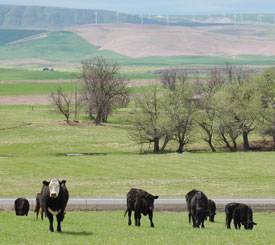The economic value of farmland
by Kelly Sanderbeck, Communications and Development Director, PCC Farmland Trust
This article was originally published in June 2009
Until now, the costs of pollution and exploitation of finite resources haven’t been factored into the price of food. Profits are privatized while the cost to the environment is externalized to the public.
It doesn’t have to be this way. Farmland needs to have its value recognized as more than just a source of food. In some places, that is being done.
New York Times writer Thomas Friedman recently reported on an innovative environmental strategy in Costa Rica. He calls it “payment for environmental services,” which means that if you pollute, you pay. The cost to the environment is factored into the price of doing business. Friedman explains, “You have to pay for using nature…At the same time, those protecting natural resources receive benefits.
“We need to remember that nature provides this incredible range of economic services — from carbon-fixation to water filtration to natural beauty for tourism. If government policies don’t recognize those services and pay the people who sustain nature’s ability to provide them, things go haywire.”

Perhaps it’s time to start viewing organic farmland in this framework. Not just for food, but for the unaccounted benefits. Organic farming sequesters carbon in soil, provides wildlife habitat, filters runoff, and preserves rural landscapes. These are benefits we could receive on a much larger scale if more farming was converted to organic methods.
This vision may become a reality sooner than we had hoped. This spring, the U.S. Department of Agriculture (USDA) plans to conduct a wide-scale survey of organic farming meant to help shape future food and farming policies.
Secretary of Agriculture Tom Vilsack says the survey is “an opportunity for organic producers to share their voices and help ensure the continued growth and sustainability of organic farming in the United States.”
PCC Farmland Trust farmers will be participating in this survey. We hope that the challenges and successes our farmers have experienced will inform and inspire others, and that the trust will continue to help change our national policies, one farm at a time.
